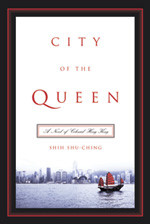
A NOVEL OF COLONIAL HONG KONG
Hong Kong in the cyclone season: intense humidity; wooded mountains stretching steeply upwards, encircling the harbour, shrouded in a grey soupy mist; star ferries and sampans anchored in the stormy waters. Stepping onto land, smelling the fragrant noodle and steamed dumpling stalls, the shops selling an unimaginable range of dried foods from sea cucumbers to bird's nests, people rushing about their daily business, skyscrapers, the pursuit of wealth… Shih Shu-Ching brilliantly evokes the hustle and bustle of Hong Kong.
Rewind 150 years, the dawn of the colony: a quiet port beginning to thrive on the trade of opium, Kowloon is a patch of uninhabited, sacred land. The British swoon in the heat and oversee the colony from the cooler breezes halfway up the mountain. Into this growing city, Huang Deyun, aged 13, is transported, having been kidnapped in rural China and sold into prostitution. City of the Queen is the story of how tenacious, resilient Huang Deyun faces life from her early days as a prostitute and then a mistress, and how she survives and ultimately succeeds.
Shih Shu-Ching intertwines the life of Huang with the fate of Hong Kong: colonisers and the colonised, mistresses and masters, the struggle for power, wealth, the moral high ground. Neither Huang nor Hong Kong control their own destinies; both are occupied and overtaken by their masters. Huang thinks she is saved and becomes enraptured when her English client, Adam Smith, takes her as his mistress to keep up appearances; she is oblivious to his shame of being in love with a Chinese woman. Adam Smith fights against falling in love with Huang, and eventually abandons her and marries an English woman in his attempt to maintain what he sees as the moral high ground. In parallel, the novel explores how Hong Kong is exploited by the British for the huge profits to be made from the opium trade, while few English advertised their business interests, instead glossing over their strategic occupation with society gatherings and shady verandas . Yet when the colonisers departed, both the Hong Kong people and Huang mourned their loss.
Critically acclaimed in Taiwan, this English interpretation of City of the Queen condenses Shih Shu Ching's epic
story of Huang Deyun and her descendants into three hundred pages. A glass-half-empty kind of person might question why
the novel was not translated in its entirety (700 pages) and why its narrative has shifted to the third person; even the
translators say that 'in an ideal world' the novel would not have been 'pared down'. Yet it is fantastic for the novel
to have been translated into English at all. Despite the shift from first person to third person narration, I did not
feel disconnected from Huang Deyun's experiences; the narrative still describes Huang's innermost thoughts and feelings.
Although the section of the book dealing with the life of Huang's granddaughter feels rushed, there is much to be enjoyed
here. The highlights of City of the Queen are the history of Hong Kong and the story of Huang Deyun's life, which
are compelling.

Columbia Univ. Press, paperback (abridged), 9780231134576
